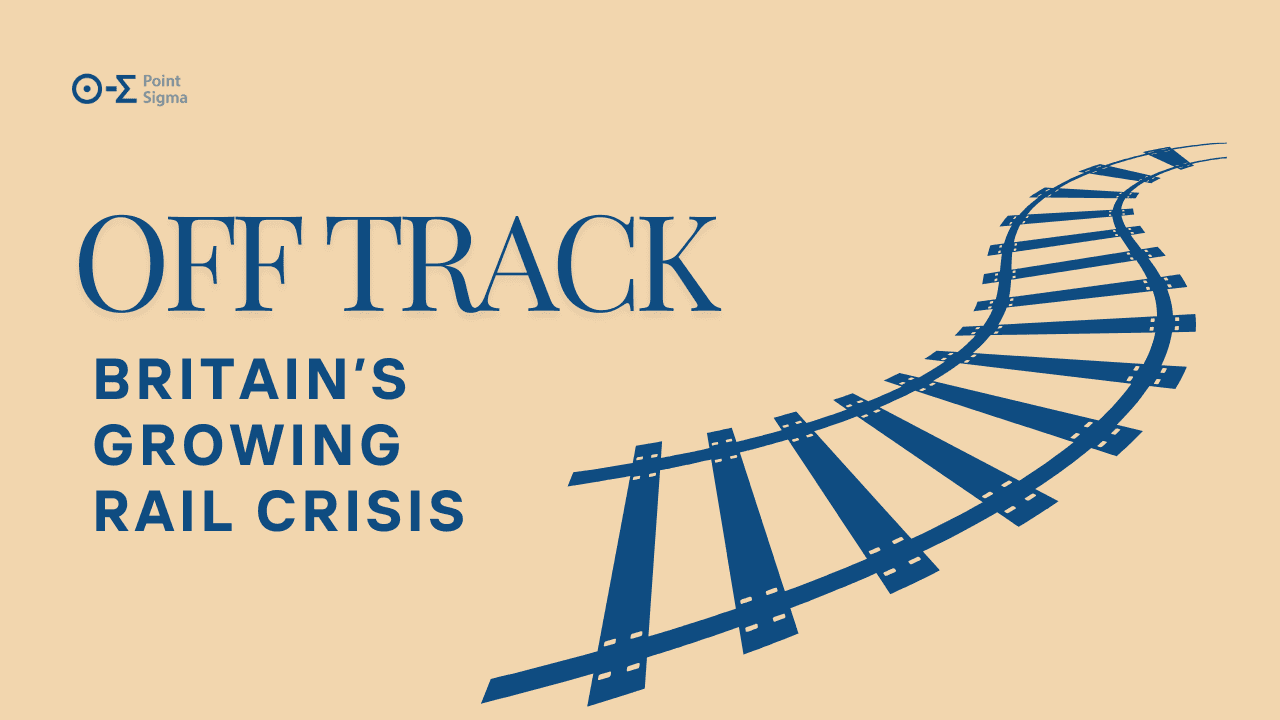Dec 2, 2024
Insights

If you've ever stood on a cold platform watching the minutes tick by, or missed an important meeting due to a delayed train, you are not alone. British trains ran behind schedule by 3.7 million minutes in the 2022/2023 financial year - each minute of delay multiplying across thousands of affected passengers daily.
And that's just the recorded delays - it doesn't include the thousands of canceled services or trains that never left their starting station. Our analysis of Network Rail's delay attribution data across 23 train operators reveals a railway system under unprecedented strain.
The impact extends beyond mere inconvenience: over 50% of affected passengers reported increased work-related stress and disrupted home life.

And these delays are on the rise
Rail performance declined notably in FY 2022/23, with delay rates climbing from 10% to 13% across 6.64 million planned services. The second quarter proved especially challenging, with 1.71 million planned trains affected by both industrial action and extreme weather, including an unprecedented July heatwave. The situation worsened in Q3, recording the highest cancellation rate (4.1%) since 2014 measurements began, with 88,703 cancellations across 23 severely disrupted days.Ten days of national strike action during this period further compromised service reliability.

Why are trains delayed or canceled?
The three primary causes of disruption were network management (timetabling, infrastructure, and signaling issues), track conditions (requiring speed restrictions and repairs), and fleet issues (both technical and operational).

Seasonal patterns emerged clearly, with extreme weather impacts peaking in July (heatwave) and November (autumn conditions). These challenges exposed the network's vulnerability to the climate, crew issues, and aging infrastructure.

Weekday commutes are hit hardest
Bearing the brunt of delays, and creating a ripple effect through the business day. The combination of maximum service frequency and peak passenger volumes makes these periods particularly vulnerable to disruption. With tracks running at near-full capacity and trains carrying more passengers, there's limited flexibility to recover from disruptions, causing delays to cascade through the network.

Operator performance varies significantly
While larger operators like Govia Thameslink Railway (GTR) and Northern Trains show high total delay minutes, they also run the most services. However, Avanti West Coast stands out, ranking high in delay minutes despite running far fewer trains (72,399 compared to GTR's 1,029,379) and posting the worst cancellation rate at 9.1%.

It is important to put this in context though as performance across the rail network faces different challenges based on route characteristics. For instance, busy sections like the West Coast Main Line (used by Avanti) face intense traffic with a mix of express, local, and freight services sharing the same tracks. The London approaches are particularly congested, with multiple operators competing for limited track and platform space at major terminals.
Other challenging sections include the East Coast Main Line, the Great Western Main Line, and cross-country routes that intersect multiple other services. Network bottlenecks, complex junctions, and areas with old infrastructure can also significantly impact performance. Additionally, routes serving major commuter areas face different challenges compared to long-distance intercity routes or rural services.

Also useful to examine the average number of delay events per delayed train for each train operator across each railway period. A railway period is an industry-standard time measurement where the year is divided into 13 four-week periods (rather than months).
We see Avanti West Coast, Cross Country, and London North Eastern Railway (LNER) show up here across the entire financial year, with trends around Q2 (July-September) and Q3 (October-December) of the financial year 2022/2023 enduring here as well. With Avanti having a particularly concerning 2.7 average delay events per train in the 8th railway period (approximately November).

Government and industry response
The government's response has evolved substantially through 2024, beginning with February's draft Rail Reform Bill and culminating in September's launch of Shadow Great British Railways (Shadow GBR). This interim body brings together the Department for Transport, Network Rail, and publicly-owned operators, working to implement the 2021 Williams-Shapps Plan's vision of unified national leadership and a new commercial model to replace franchising.
Looking ahead
While these initiatives and funding plans are underway to improve service reliability, the immediate outlook suggests continued challenges. The industry faces pressure to modernize while maintaining daily operations, all within tight budget constraints and increasing climate challenges. Success will require coordinated effort between operators, and government stakeholders, with a clear focus on both immediate reliability improvements and long-term strategic investments.
Keen on transportation insights? Read our analysis of the pandemic’s impact on cycle safety and the bicycle industry.
——
As always, data processing and visualization for this story was automated using Point Sigma. Human input focused on uploading data, selecting and refining auto-generated graphs, and interpreting results and writing analysis. Refinements included adding headings, and visual aids. Learn more about Point Sigma.